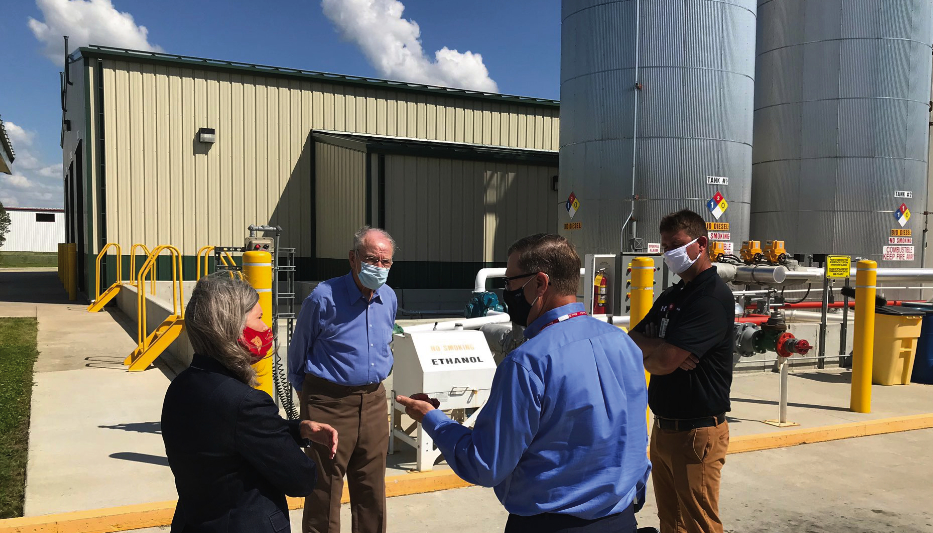All
The Politics of the RFS

Missing RVOs, gap SREs and campaign trail promises
In a webinar on the Renewable Fuel Standard (RFS) held during this year’s Virtual HEAT Show, one attendee typed into the Q&A chat, “The RFS is too complicated for politics.”
If only it were so simple.
Oil & Energy has in past issues covered several different aspects of the notoriously complex RFS, from the yearly Renewable Volume Obligations (RVOs) to the controversial small refinery exemptions (SREs).
This year, there has been no shortage of controversy over both items. The EPA is yet to publicly propose its annual RVOs as of press time. The proposal is normally published in July and approved by late November. Not to be outdone, SREs — a constant source of tension between biofuel producers and oil refiners — have become something of a political hot-button issue in this election year.
This story is constantly developing such that this article might very well be outdated by the time our magazine arrives in readers’ hands. In any event, here is a broad overview of the “current” political situation surrounding the RFS. As always, Oil & Energy will endeavor to keep readers up-to-date on this story in future issues.
Missing RVOs
On May 13, 2020, the White House Office of Management and Budget (OMB) received a draft of the EPA’s proposed RVOs for 2021, with biomass-based diesel volumes for 2022. Few publications even covered this non-event, as it is typically just the first step in a rule proposal process that can take months.
Proposed RVOs are not officially made public until OMB has completed its review. As of press time, it would appear that hasn’t happened, so interested parties can only speculate as to the whether biofuel blending standards will increase in 2021 and 2022. A May 20 story published by Reuters said the RVOs would indeed rise, citing sources close to the draft proposal.
According to that article, the 2021 RVOs would call for 5.17 billion gallons of advanced biofuels, up from 5.09 billion billion gallons in 2020 and 2.76 billion gallons of biomass-based diesel in 2022, up from 2.43 billion in 2021.
Again, none of this can be confirmed at press time as the RVOs have not yet been made public and EPA has not yet commented on the proposal. EPA Administrator Andrew Wheeler did, however, address the delay during an August 26 press call. At this time, the EPA leader said his agency was working to finalize the RVOs “as quickly as possible,” noting that previous delays dragged on longer than the current holdup.
“I remember there in the Obama-Biden administration they were actually two years late on setting the RVOs,” Wheeler said. “So we certainly aren’t going to break their record.”
Wheeler cited COVID-19 and SRE petitions as causes for this year’s delay. There were at least 67 SRE petitions under review at the time of the press call, with some dating as far back as 2011. “We have to weigh all the issues very carefully because there’s a lot of litigation around this issue,” said Wheeler. “So any decision we make will be litigated so we have to be very thorough in our reviews.”
Gap SREs
Much of the latest litigation around SREs relates to a decision issued by the U.S. Court of Appeals for the 10th Circuit on January 24, 2020. (We’re getting into the weeds a bit here, so strap in.) In Renewable Fuels Association v. EPA, the 10th Circuit struck down three previously approved SRE extensions on the grounds that the exemptions were not continuously extended and were based on economic factors outside of the RFS.
On March 25, the refiners whose SREs were struck down appealed for a rehearing of the decision, but the Trump administration decided not to join in on the appeal — a decision applauded by biofuel proponents such as the National Biodiesel Board (NBB). On April 7, the 10th Circuit denied the peitition to rehear the case (see “Appeals Court Will Not Rehear SRE Case,” Oil & Energy Volume 22/Issue 4, page 43).
Following the 10th Circuit decision, NBB and other renewable fuel associations argued that the ruling should apply nationally and that EPA should limit future exemptions to refineries that can meet the standards set by the court. Sources suggested that if this were to happen, it would result in numerous SRE exemptions being overturned and pending SRE petitions being denied.
Perhaps sensing trouble ahead, refiners flooded the EPA with scores of “gap-year” SRE petitions, named as such because they were filed for years in which the refiners had not been granted SRE extensions. The legal strategy, presumably, was to circumvent the “continuous extension” aspect of the 10th Circuit ruling.
Renewable fuel associations came out in full force against this effort.
On an August 18 visit to Iowa, the president heard from Senator Joni Ernst (R-IA), a longtime RFS defender, that Iowa farmers were hoping EPA would reject the gap-year SRE petitions. “Alright,” Trump responded. “We’ll speak to [EPA]. I’ll speak to them myself. I’ll do it myself.”
On August 24, NBB began running an ad campaign urging the president and EPA administrator “to reject oil refiner exemptions and keep their promise to farmers.” The ads aired for two weeks in six Midwestern states: Iowa, Illinois, Kansas, Minnesota, Nebraska and Wisconsin. NEFI also expressed its concerns to EPA.
On September 14, EPA Administrator Wheeler wrote 17 refiners informing them that the agency was denying their gap-year SRE petitions. “Since 2017, 17 small refineries [Ö] have submitted 68 individual petitions asking EPA to either reconsider exemption denials or grant exemptions for prior years in which the refineries had not sought them,” Wheeler wrote. EPA rejected 54 of the 68 gap-year SRE petitions.
The NBB welcomed this decision. “On behalf of U.S biodiesel producers across the country, we welcome President Trump's and Administrator Wheeler's decision to deny many of the so-called gap-filling exemption petitions,” NBB Vice President of Federal Affairs Kurt Kovarik stated. “The decision to deny these absurd petitions filed by refiners simply to skirt their obligations under the law is the right call. I am hopeful EPA will continue to apply this standard to the remaining gap exemptions and to future petitions.”
Campaign Trail Promises
Pressure to overturn the gap-year SREs wasn’t just coming from farmers, biofuel proponents and Midwest senators. On August 25, the day after NBB began running its ad campaign, Democratic presidential nominee Joe Biden issued a statement describing his commitment to the RFS and criticizing the Trump administration’s handling of the program.
“Instead of standing with those who till our land and sow our fields, we have a president who has sold out our farmers by undercutting the Renewable Fuel Standard with the granting of waivers to Big Oil,” Biden said. “Those waivers severely cut ethanol production, costing farmers income and ethanol plant workers their jobs. Now, President Trump refuses to announce the 2021 renewable fuel production levels until after the election, leaving farmers concerned of further cuts to production. The Renewable Fuel Standard marks our bond with our farmers and our commitment to a thriving rural economy. Donald Trump doesn't respect that connection, and he's thrown it away to the detriment of generations of producers across the Midwest and around the country — many of whom put their trust in him four years ago.
“The Obama-Biden Administration kept our word to farmers,” he continued. “A Biden-Harris Administration will promote and advance renewable energy, ethanol, and other biofuels to help rural America and our nation’s farmers, and will honor the critical role the renewable fuel industry plays in supporting the rural economy and the leadership role American agriculture will play in our fight against climate change.”
But would Biden continue to support the RFS if elected, or would he instead roll renewable fuels into alternate climate action legislation, such as bills proposed this year by House and Senate Democrats? That remains to be seen, but sources indicate that if Democrats were to take both the White House and the Senate this November, they might very well look to replace the RFS with a nationwide Low-Carbon Fuel Standard modeled after the California program.
Of course, all of this remains up in the air for now, as do the 2021 RVOs, as does an appeal to the U.S. Supreme Court of the 10th Circuit’s January decision. The Trump administration did not join in on that appeal. Does that mean we can look forward to an RFS free from thorny politics?
If only it were so simple.
Related Posts
 From Retailer to Representative: Chris Keyser’s Road to the Vermont State House
From Retailer to Representative: Chris Keyser’s Road to the Vermont State House
Posted on June 16, 2025
 Northeast Working Group for Industry Principles Gets to Work
Northeast Working Group for Industry Principles Gets to Work
Posted on May 8, 2025
 Trump Policies and Energy Markets
Trump Policies and Energy Markets
Posted on April 28, 2025
 NEFI Introduces the National Home Comfort PAC
NEFI Introduces the National Home Comfort PAC
Posted on April 28, 2025
Enter your email to receive important news and article updates.
